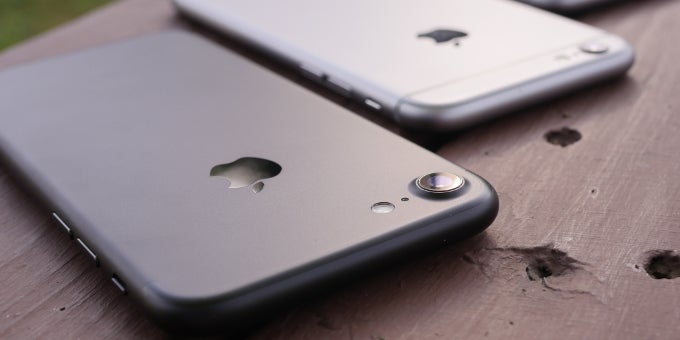Apple admits it artificially slows down iPhones with older batteries

Apple has admitted that it artificially slows down iPhones with older batteries - even some iPhones with less than 1 year on their battery clock - to prevent them from even more serious issues like unexpected shutdowns.
The company kept this under the radar from the public for nearly a year, but a recent user investigation on Reddit and a subsequent confirmation from benchmarks, provoked an official response.
The issue boils down to the following: aging batteries cannot hold a charge as good as a new one and when the battery level is low or when you use your phone in cold temperatures, it may not be able to deliver enough power. Furthermore, this becomes a problem when you open a heavy webpage that taxes the processor to its maximum, or when you play a demanding game, as an aging battery with lower capacity just cannot deliver enough power in those times, and this peak load will force the phone to unexpectedly shut-down. This is exactly what happened to a considerable number of iPhone 6s devices in late 2016, about a year into the lifecycle of the phone, when the battery already started to show its age.
At the end of January 2017, amidst ever-growing complaints about unexpected iPhone shut-downs, Apple released iOS 10.2.1, a software update that seemed to fix the shut-down issue in a mysterious way. At the time, no one asked how Apple did it and the secretive company itself never publicly disclosed the method it had used. But not long after this update, a new issue popped up: iPhones started running slower, much slower.
Fast forward to these past couple of weeks, when an independent user investigation pinned down the issue to a single cause: Apple was artificially slowing down iPhones with aging batteries, throttling their processors to run at lower speeds. Limiting the processor performance means that it will no longer require that much power from the battery, so the phone will not unexpectedly shut down. But it also means that your phone will simply run slower, and this is what happened to many iPhone 6s and iPhone 6 devices. The iOS 10.2.1 update introduced this new "feature" to the iPhone 6s, 6s Plus, 6, 6 Plus and SE, and the more recent iOS 11.2 updated extended it to the iPhone 7 and iPhone 7 Plus. Apple also plans to further extend this to newer iPhone models as their batteries start to age.

Aging iPhone 7 devices also hit with lower performance after iOS 11.2 update
Here is Apple's official statement:
"Our goal is to deliver the best experience for customers, which includes overall performance and prolonging the life of their devices. Lithium-ion batteries become less capable of supplying peak current demands when in cold conditions, have a low battery charge or as they age over time, which can result in the device unexpectedly shutting down to protect its electronic components.
Last year we released a feature for iPhone 6, iPhone 6s and iPhone SE to smooth out the instantaneous peaks only when needed to prevent the device from unexpectedly shutting down during these conditions. We've now extended that feature to iPhone 7 with iOS 11.2, and plan to add support for other products in the future."
Last year we released a feature for iPhone 6, iPhone 6s and iPhone SE to smooth out the instantaneous peaks only when needed to prevent the device from unexpectedly shutting down during these conditions. We've now extended that feature to iPhone 7 with iOS 11.2, and plan to add support for other products in the future."
In a way, this is indeed a fix for unexpected shut-downs, but the complete lack of communication from Apple about this is a problem. After all, the natural reaction of most people when they see their iPhone slowing down is not "I need a new battery" (users never get a notification that their battery is in need of replacement), but it's more to the tune of "I need a new phone." A phone with an old battery that runs out of charge faster is something that is expected, but having a slower running iPhone because of an old battery is definitely not anticipated.
Apple confirms it slows down some iPhones with aging batteries
For years, conspiracy theories ran wild saying that Apple is slowing down its older iPhones on purpose, to push people into buying a new device sooner. These latest findings do not confirm Apple slowing down iPhones for no reason, but they do show that the company can spare important facts and mislead its customers. It also raises questions whether there were similar practices in the past that we don't know about.
What is worse, it shows that iPhones - despite their great resale value and years-long software update support - age faster than anticipated, sometimes requiring a battery replacement service in less than a year. In stark contrast, other companies like rival Samsung promise that their flagship products like the Galaxy S8 series will have a battery that retains 95% of its capacity after two years of use. To put this into perspective, an 80% battery wear is traditionally considered the point when it needs replacement.
At the end of the day, contrary to what we have believed for a long while, we now know that older iPhones do indeed get slower with time. We, however, also now have a solution: replace the battery. This is free within the two-year iPhone warranty, if you prove that your battery is indeed old enough, but will cost consumers $79 for an out-of-warranty iPhone and requires a visit to an Apple Store or sending your iPhone to Apple via mail (which in turn means that you will be left without a phone for at least a few days while the battery is being replaced).
source: CNET










Things that are NOT allowed: